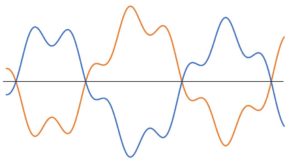
Calling headphones noise-cancelling can be deceptive. While it is true that noise-cancelling headphones are capable of counteracting some background noises, they are not perfect for all types of noise. In this article we will discuss the inner workings, limitations, and potential tradeoffs of noise-cancelling headphone technology.
All Headphones are Noise Cancelling
Technically all headphones are noise cancelling on some level. Just as putting your hands over your ears blocks incoming sound, any headphone you put on, in, or over your ear will block sound. This is especially true of high frequency sound. The short wavelength of high frequency sound is easily absorbed by the kind of foam used for headphones.
Muffling sound is a form of noise control called passive noise control (passive because there is no extra signal processing going on to deal with the noise.) For many situations, “normal” passive noise control headphones are sufficient. However, in places with high levels of background noise, like inside airplanes or car, active noise control can give you the added boost you need to listen to music in peace.
Active Noise Control
To understand active noise-cancelling headphones, we need to first talk about sound a little bit. Sound travels through the air in pressure waves. Since sound is a wave, it obeys certain physical rules. For example, let’s look at a theoretical recorded sound wave, represented on the graph below:

If you take this sound and flip it 180 degrees (also known as a phase shift of 180 degrees) it will look like this:

Notice how the wave’s peaks become troughs and vice versa when we do this. If you play the two sound waves on top of each other like this, they will cancel out.

This phenomenon is called destructive interference. Active noise-cancelling headphones use this phenomenon to your advantage.
A tiny microphone on your active noise-cancelling headphones picks up the background noise—say the roar of the engine outside the plane. Then it feeds the signal through some circuitry which performs a 180-degree flip on the sound. Then the circuitry combines the flipped signal with your music and plays it through tiny speakers into your ears. The result is that you hear your music clearly, while background noise gets negated by the flipped sound. The headphones “run interference” for you so you can focus on your music, podcast, or audiobook.
Tradeoffs
While the theory behind active noise-cancelling headphones is solid, real-world results can be mixed. Many people swear by active noise-cancelling headphones because they reduce background noise, especially in places with continuous background noise. Such people often find they sleep better on planes with their headphones actively cancelling noise. Also, noise cancellation can reduce the psychological fatigue of listening to loud, low frequency noise for extended periods of time.
On the other hand, active noise-cancelling headphones do not work for all types of sound. For example, short, loud sounds (called impulses in acoustics) are difficult for active noise control circuits to deal with. In order to cancel sound, the system needs to be able to predict incoming noise waveforms, otherwise it will be too late to process and negate the noise. That’s why continuous noises are easiest for such systems to deal with—they are predictable. If you are hoping your noise cancelling headphones will magically erase the intermittent shrieking of the kids in the backyard, you might be in for disappointment.
That said, noise-cancelling technology is improving every year. If you are willing to shoulder the extra cost and weight of the active noise-cancelling technology, you will certainly notice the difference active control can make in your listening experience. Some listeners report reduced audio quality or high-frequency hissing when they use noise-cancelling headphones. However, for all except the most discriminating audiophiles, such minor problems are preferable to not being able to hear their music at all.
As a final work of caution, remember that ears are sensitive. Listening to loud music, especially for extended periods of time, can ruin your hearing and lead to deafness. Whether or not you choose noise-reducing headphones, remember that those who truly love to listen to music protect their hearing so they can continue listening for the rest of their lives.
Further Reading:
https://en.wikipedia.org/wiki/Noise-cancelling_headphones
AUG
2019

About the Author: